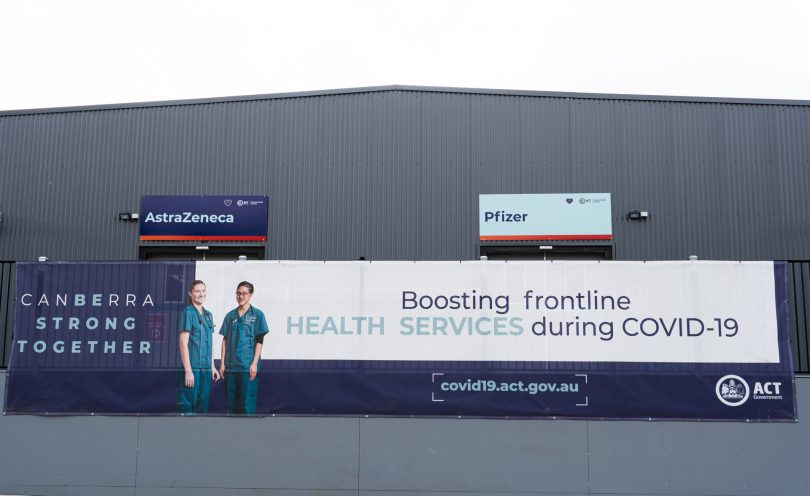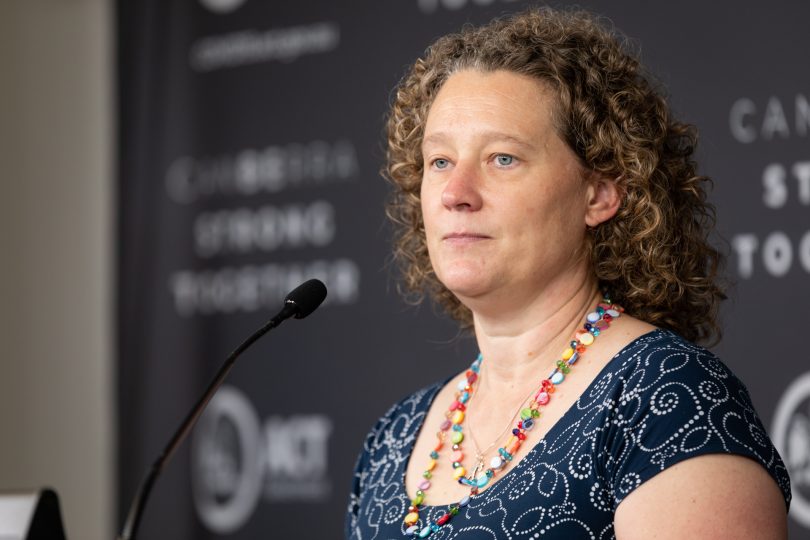
Vaccinations are continuing today for eligible people at the Garran Surge Centre opposite Canberra Hospital. Photo: File.
The ACT is reviewing its COVID-19 vaccine stocks and supplies in the wake of the decision to limit the administration of the first dose of the AstraZeneca vaccine to adults aged over 50 years due to concerns about the potential for blood clots.
The Commonwealth announced the change last night in what was described as an abundance of caution after the European Union confirmed a link between the vaccine and blood clots in very rare circumstances.
In a fast-evolving situation, ACT Health worked through the night to prepare the Garran Surge Centre for operation today so people could receive the appropriate vaccine – the Pfizer vaccine for under-50s and AstraZeneca for those older than 50.
Chief Health Officer Kerryn Coleman said there were enough stocks on hand for today but ACT Health would need to review the situation going forward.
“We will be able to manage today, so one of the things we need to do today is to very closely have a look at the numbers, to look at our vaccine stocks and supplies, what we are anticipating to come over the next little while and combine that with the numbers of people under-50 who are in the priority groups 1a and 1b,” she told ABC radio.
“We need to work with our other vaccine colleagues such as general practices and the GP respiratory assessment clinics to work out how do we get their patients and their clients that are under-50 and need a vaccine into our clinic for Pfizer.”
Dr Coleman urged eligible people to be patient and not try to make appointments today.
“What we are asking is, if you have received an invitation or you are eligible for a vaccination at the clinic under the 1a or 1b program, please don’t ring to make an appointment today. We are working through what we need to do, and more information will be coming out. Just hold on and we’ll be out to you early next week,” she said.

Dr Kerryn Coleman: be patient and check with your GP. Photo: Michelle Kroll
Dr Coleman played down the setback to the vaccine rollout, which will now require greater supplies of the Pfizer vaccine.
“I think this is just another one of a small barrier or a small stone we have to step over in our fight against COVID,” she said.
“As with all vaccines and medicines, we do come across sometimes some unusual and unanticipated side effects, so we are just working through the consequences of that and we will be coming out with information over the next couple of days for people and we are sure we will get the vaccination program back on track.”
She said the incidence of blood clots was extremely small, with the European experience showing that four to six people in every million who received their first dose of Astra Zeneca can develop this syndrome.
“I guess the concern is that this syndrome does have a significantly high risk of death and ongoing morbidity. So it’s a very serious outcome but a very rare condition,” Dr Coleman said.
“We also are seeing that the risk of disability and death, as well as the rate of this new blood clotting syndrome, may actually be higher in young people.”
She said the blood clotting was very different from those from taking the contraceptive pill or travelling on flights and urged people with those conditions to talk to their GP.
“But that isn’t what we are talking about here. This is much rarer and a much different reaction to the vaccine,” she said.
Commonwealth Chief Medical Officer Paul Kelly said last night that the Australian Technical Advisory Group on Immunisation had recommended that the Pfizer vaccine be used in adults aged less than 50 years who have not already received the first dose of the AstraZeneca vaccine.
Providers should only give the first dose of AstraZeneca to adults under 50 years of age where the benefit clearly outweighs the risk for that individual’s circumstances.
Those who have had their first dose of the COVID-19 AstraZeneca without any serious adverse events can safely be given their second dose.












